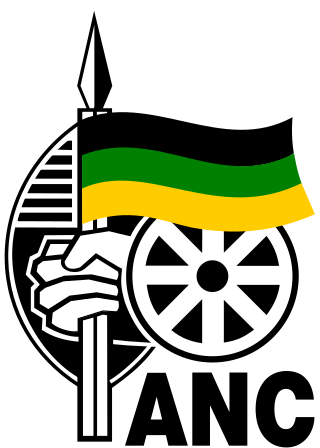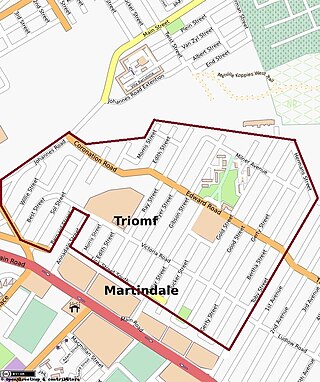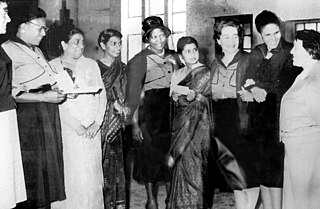Related Research Articles

The African National Congress (ANC) is a social-democratic political party in South Africa. A liberation movement known for its opposition to apartheid, it has governed the country since 1994, when the first post-apartheid election installed Nelson Mandela as President of South Africa. Cyril Ramaphosa, the incumbent national President, has served as President of the ANC since 18 December 2017.

Soweto is a township of the City of Johannesburg Metropolitan Municipality in Gauteng, South Africa, bordering the city's mining belt in the south. Its name is an English syllabic abbreviation for South Western Townships. Formerly a separate municipality, it is now incorporated in the City of Johannesburg Metropolitan Municipality, and one of the suburbs of Johannesburg.
Joe Slovo was a South African politician, and an opponent of the apartheid system. A Marxist-Leninist, he was a long-time leader and theorist in the South African Communist Party (SACP), a leading member of the African National Congress (ANC), and a commander of the ANC's military wing Umkhonto we Sizwe (MK).

The Freedom Charter was the statement of core principles of the South African Congress Alliance, which consisted of the African National Congress (ANC) and its allies: the South African Indian Congress, the South African Congress of Democrats and the Coloured People's Congress. It is characterised by its opening demand, "The People Shall Govern!"

Ernest Urban Trevor Huddleston was an English Anglican bishop. He was the Bishop of Stepney in London before becoming the second Archbishop of the Church of the Province of the Indian Ocean. He was best known for his anti-apartheid activism and his book Naught for Your Comfort.

Sophiatown, also known as Sof'town or Kofifi, is a suburb of Johannesburg, South Africa. Sophiatown was a black cultural hub that was destroyed under apartheid, It produced some of South Africa's most famous writers, musicians, politicians and artists. Rebuilt under the name of Triomf, and in 2006 officially returned to its original name. Sophiatown was one of the oldest black areas in Johannesburg and its destruction represents some of the excesses of South Africa under apartheid.
The Treason Trial was a trial in Johannesburg in which 156 people, including Nelson Mandela, were arrested in a raid and accused of treason in South Africa in 1956.

Kliptown is a suburb of the formerly black township of Soweto in Gauteng, South Africa, located about 17 km south-west of Johannesburg. Kliptown is the oldest residential district of Soweto, and was first laid out in 1891 on land which formed part of Klipspruit farm. The farm was named after the klipspruit that runs nearby. From 1903 the area was home to informal settlements, and the area now contains a mixture of purpose-built housing and many shacks and other informal homes which form the Chris Hani and Dlamini settlements.

The apartheid system in South Africa was ended through a series of bilateral and multi-party negotiations between 1990 and 1993. The negotiations culminated in the passage of a new interim Constitution in 1993, a precursor to the Constitution of 1996; and in South Africa's first non-racial elections in 1994, won by the African National Congress (ANC) liberation movement.

The environmental movement in South Africa traces its history from the early beginnings of conservation, to the rise of radicalism and activism amongst local ecologists. Before the Chernobyl disaster and the fall of the Berlin Wall, there were very few green activist groups in the country. Koeberg Alert and the Dolphin Action and Protection Group are probably two of the oldest post-conservation groups.

Internal resistance to apartheid in South Africa originated from several independent sectors of South African society and took forms ranging from social movements and passive resistance to guerrilla warfare. Mass action against the ruling National Party (NP) government, coupled with South Africa's growing international isolation and economic sanctions, were instrumental in leading to negotiations to end apartheid, which began formally in 1990 and ended with South Africa's first multiracial elections under a universal franchise in 1994.

The African National Congress (ANC) has been the governing party of the Republic of South Africa since 1994. The ANC was founded on 8 January 1912 in Bloemfontein and is the oldest liberation movement in Africa.
Esther Barsel was a South African political activist and long-standing member of the South African Communist Party (SACP). She was a member of both her local African National Congress branch and the SACP's Johannesburg Central Branch.
The Congress Alliance was an anti-apartheid political coalition formed in South Africa in the 1950s. Led by the African National Congress, the CA was multi-racial in makeup and committed to the principle of majority rule.
Archibald Jacob Gumede (1914–1998) was a South African anti-apartheid activist, lawyer and politician. Gumede was born in Pietermaritzburg to Josiah Tshangana Gumede, an early African National Congress leader. Archie Gumede led the Natal delegates at the 1955 Congress of the People in Kliptown during which the Freedom Charter was written. He was later an attorney and practiced in Pietermaritzburg. He was a leader in the United Democratic Front, a broad based coalition of groups seeking to end apartheid. Following the end of apartheid in 1994, Gumede became a member of the National Assembly of South Africa before dying in office in 1998.

The Riotous Assemblies Act, Act No 17 of 1956 in South Africa prohibited gatherings in open-air public places if the Minister of Justice considered they could endanger the public peace. Banishment was also included as a form of punishment.
Noordgesig is a township in Soweto, situated at the edge of area's northernmost boundary, but within its territory. It is the first township seen on entering Soweto from the frequently used New Canada Road. Noordgesig is a Coloured township. It is colloquially called "Bulte"(meaning Hills) by its residence and neighbors, as depicted by the Mine Dumps surrounding the Township. The name "Bulte" was coined as a form of endearment by the residence for the longest time.

Walter Sisulu Square, formally known as the Walter Sisulu Square of Dedication, is located in the heart of Kliptown in Soweto, South Africa.

The Federation of South African Women (FEDSAW) was a political lobby group formed in 1954. At FEDSAW's inaugural conference, a Women's Charter was adopted. Its founding was spear-headed by Lillian Ngoyi.
The 48th National Conference of the African National Congress (ANC) took place from 2 to 7 July 1991 at the University of Durban–Westville in Durban, KwaZulu-Natal. It was the first national conference of the ANC since the organisation was banned by the apartheid government in 1960 and marked the ascension of Nelson Mandela to the ANC presidency, which since 1967 had been held by Oliver Tambo.
References
- ↑ Goldberg, Denis (2016). A Life for Freedom. University Press of Kentucky. pp. 43–44.
- 1 2 3 4 5 "The Freedom Charter (With a Note by Hilda Bernstein)". Third World Quarterly. 9 (2): 672–677. April 1987. doi:10.1080/01436598708419993. JSTOR 3991903. – via JSTOR (subscription required)
- 1 2 3 "The Freedom Charter is adopted in Kliptown: Sunday, 26 June 1955". South African History Online. 22 June 2018. Retrieved 17 March 2019.
- 1 2 3 4 Suttner, Raymond (1985). "The Freedom Charter: The People's Charter in the 1980s". Crime and Social Justice (24): 72–95. JSTOR 3991903. – via JSTOR (subscription required)
- 1 2 3 4 "Congress of the People Held in South Africa". Africa Today. 2 (3): 10. July 1955. JSTOR 4183718. – via JSTOR (subscription required)
- 1 2 3 4 5 "The Kliptown Conference". Africa Today. 2 (4): 6. September 1955. JSTOR 4183735. – via JSTOR (subscription required)
- ↑ "Significance of the Congress of the People and the Freedom Charter". South African History Online. 4 August 2016. Retrieved 17 March 2019.